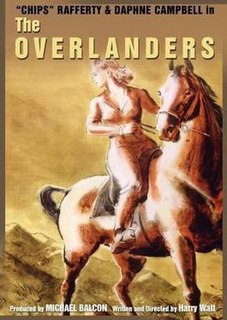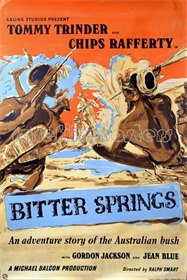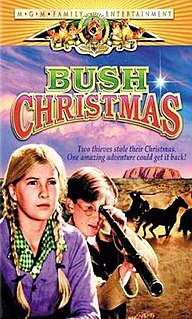Related Research Articles

Frederick George Peter Ingle Finch was an English-born Australian actor. He is best remembered for his role as crazed television anchorman Howard Beale in the 1976 film Network, which earned him a posthumous Academy Award for Best Actor, his fifth Best Actor award from the British Academy of Film and Television Arts, and a Best Actor award from the Golden Globes.

Jedda, released in the UK as Jedda the Uncivilized, is a 1955 Australian film written, produced and directed by Charles Chauvel. His last film, it is notable for being the first to star two Aboriginal actors, Robert Tudawali and Ngarla Kunoth in the leading roles. It was also the first Australian feature film to be shot in colour.

Ronald Egan Randell was an Australian actor. After beginning his acting career on the stage in 1937, he played Charles Kingsford Smith in the film Smithy (1946). He also had roles in Bulldog Drummond at Bay (1947), Kiss Me Kate (1953), I Am a Camera (1955), Most Dangerous Man Alive (1961) and King of Kings (1961).
Ronald Grant Taylor was an English-Australian actor best known as the abrasive General Henderson in the Gerry Anderson science fiction series UFO and for his lead role in Forty Thousand Horsemen (1940).
Blue Hills, created and written by Gwen Meredith, is an Australian radio serial about the lives of families, set in a fictional typical Australian country town called Tanimbla. The title "Blue Hills" itself derives from the residence of Dr. Gordon, the town's doctor.

The Overlanders is a 1946 British film about drovers driving a large herd of cattle 1,600 miles overland from Wyndham, Western Australia through the Northern Territory outback of Australia to pastures north of Brisbane, Queensland during World War II.

Cinesound Productions Pty Ltd was an Australian feature film production company, established in June 1931, Cinesound developed out of a group of companies centred on Greater Union Theatres, that covered all facets of the film process, from production, to distribution and exhibition.

A coffee palace was an often large and elaborate residential hotel that did not serve alcohol, most of which were built in Australia in the late 19th century.
William Percy Lipscomb was a British-born Hollywood playwright, screenwriter, producer and director. He died in London in 1958, aged 71.

Bitter Springs is a 1950 Australian–British film directed by Ralph Smart. An Australian pioneer family leases a piece of land from the government in the Australian outback in 1900 and hires two inexperienced British men as drovers. Problems with local Aboriginal people arise over the possession of a waterhole. Much of the film was shot on location in the Flinders Ranges in South Australia
Sons of Matthew is a 1949 Australian film directed and produced and co-written by Charles Chauvel. The film was shot in 1947 on location in Queensland, Australia, and the studio sequences in Sydney. Sons of Matthew took 18 months to complete, but it was a great success with Australian audiences when it finally opened in December 1949.
Lee Robinson was an Australian producer, director and screenwriter who was Australia's most prolific filmmaker of the 1950s.

Raymond Longford was a prolific Australian film director, writer, producer and actor during the silent era. Longford was a major director of the silent film era of the Australian cinema. He formed a production team with Lottie Lyell. His contributions to Australian cinema with his ongoing collaborations with Lyell, including The Sentimental Bloke (1919) and The Blue Mountains Mystery (1921), prompted the Australian Film Institute's AFI Raymond Longford Award, inaugurated in 1968, to be named in his honour.

Albert Edward Bailey, better known as Bert Bailey, was a New Zealand-born Australian playwright, theatrical manager and stage and screen actor best known for playing Dad Rudd, in both mediums, the character from the books penned by Steele Rudd.

Bush Christmas is a 1947 Australian–British comedy film directed by Ralph Smart and starring Chips Rafferty. It was one of the first films from Children's Entertainment Films, later the Children's Film Foundation.

The Kangaroo Kid is a 1950 Australian-American Western film directed by Lesley Selander.
The Fatal Wedding is a play by Theodore Kremer and a 1911 Australian silent film directed by Raymond Longford based on the melodrama, which he and Lottie Lyell had toured around Australia.
Rex Rienits was an Australian writer of radio, films, plays and TV. He was a journalist before becoming one of the leading radio writers in Australia. He moved to England in 1949 and worked for a number of years there. He later returned to Australia and worked on early local TV drama.
Lady in Danger was a play by Australian writer Max Afford. It was one of the few Australian plays to enjoy a run on Broadway. It was also adapted for radio and television.
Alan Burke was an Australian writer and film director and producer. His credits include the musical Lola Montez.
References
- ↑ "Wife helped husband write play". The Sun . No. 13, 926 (LATE FINAL EXTRA ed.). Sydney. 30 September 1954. p. 47. Retrieved 18 September 2017– via National Library of Australia.
- ↑ "Australian Play Bought In U.K." The Sunday Times . Perth. 24 July 1949. p. 3 Supplement: Sunday Times Comics. Retrieved 10 January 2013– via National Library of Australia.
- ↑ "Outback For London". The Sunday Herald . Sydney. 15 January 1950. p. 6 Supplement: Features. Retrieved 10 January 2013– via National Library of Australia.
- ↑ "Australian actor to produce a West End play". The Australian Women's Weekly . 14 January 1950. p. 36. Retrieved 10 January 2013– via National Library of Australia.
- ↑ "Australian play Pommy too raw for overseas". The Sunday Times . Perth. 2 April 1950. p. 14. Retrieved 10 January 2013– via National Library of Australia.
- ↑ "Australian Plays". The Sydney Morning Herald . 23 May 1953. p. 2. Retrieved 10 January 2013– via National Library of Australia.
- ↑ "Opening Of "Pommy" At The Royal". The Sydney Morning Herald . 11 October 1954. p. 7. Retrieved 10 January 2013– via National Library of Australia.
- ↑ "OUTBACK STORY ON STAGE". The Argus . Melbourne. 26 November 1954. p. 7. Retrieved 10 January 2013– via National Library of Australia.